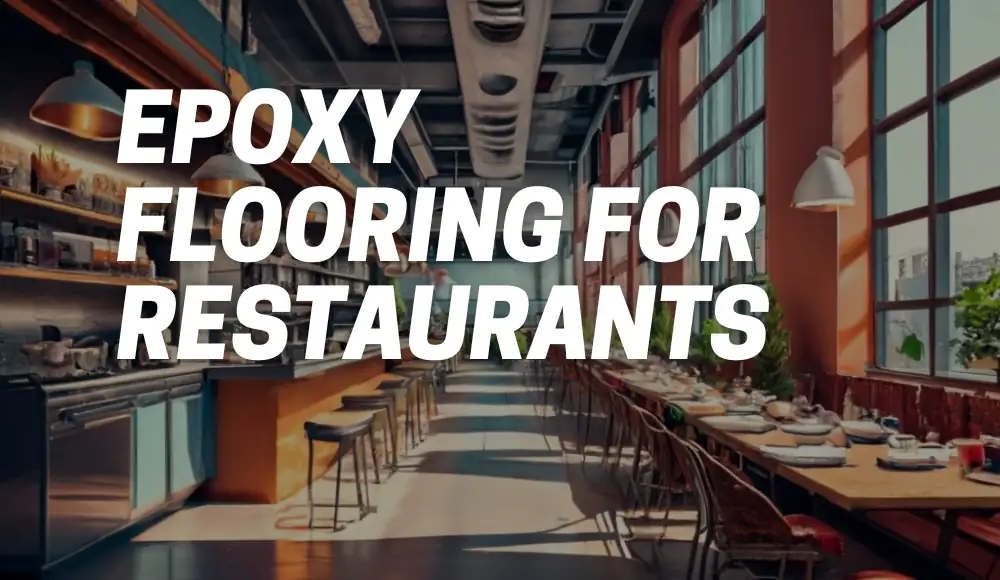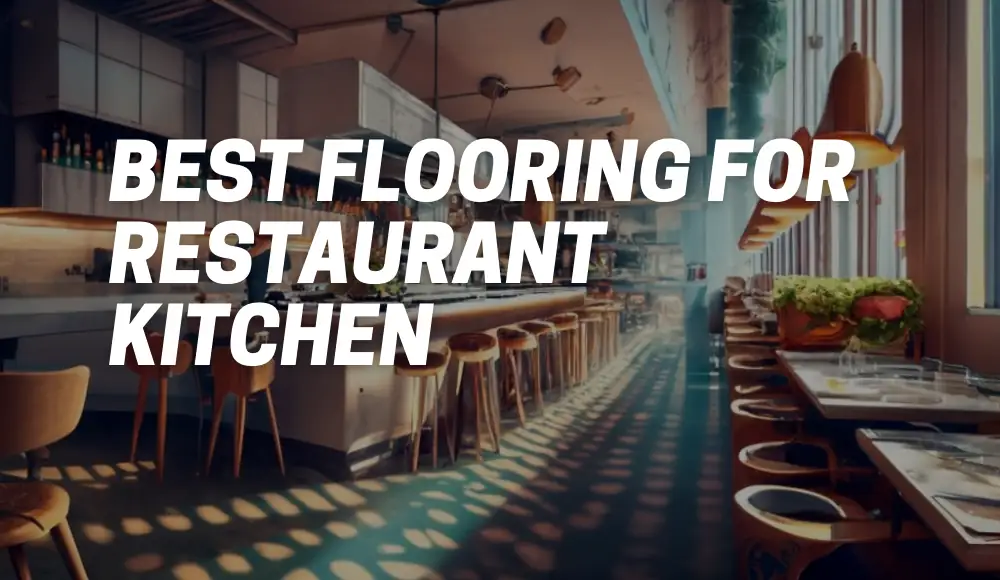Last updated on October 28th, 2023 at 01:01 pm
When it comes to crafting the perfect ambiance for a restaurant, every detail matters. From the cuisine to the decor, each element plays a crucial role in creating a memorable dining experience. One often overlooked, yet essential ingredient in this recipe for success is epoxy flooring for restaurants. In this guide, we’ll delve into the world of epoxy flooring, exploring why it’s a stellar choice for restaurants, its benefits, comparisons to other flooring options, safety concerns, installation, maintenance, and much more.
What is Epoxy Flooring, and Why is it Suitable for Restaurants?
Epoxy flooring is a high-performance flooring option created by mixing epoxy resin with a hardening agent. This chemical reaction forms a durable, smooth, and seamless surface. Epoxy is a versatile choice, but why does it shine in restaurant settings?
The Basics and Advantages
Epoxy flooring offers a myriad of advantages, making it an ideal choice for restaurants. Let’s break down the key reasons why this flooring is a must-consider for restaurant owners:
1. Durability
Epoxy flooring is incredibly robust, capable of withstanding heavy foot traffic and even the occasional dropped plate. It’s resistant to stains, chemicals, and impacts, ensuring your restaurant’s floors stay pristine even during busy shifts.
2. Cleanliness
Maintaining a sanitary environment is paramount in the food industry. Epoxy flooring’s seamless surface leaves no room for dirt, grime, or food particles to hide. It’s easy to clean, preventing the growth of bacteria and mold.
3. Aesthetics
Epoxy flooring offers a wide range of customization options. You can choose from a variety of colors, finishes, and even incorporate your restaurant’s logo or unique design elements, creating a stylish and brand-enhancing atmosphere.
How Does Epoxy Flooring Compare to Other Restaurant Flooring Options?
To give you a better perspective, let’s compare epoxy flooring to other popular restaurant flooring choices: tile, carpet, and hardwood.
Tile
While tile is a common choice, it can be porous, leading to grout lines that accumulate dirt and stains. Epoxy, on the other hand, provides a seamless, easily cleanable surface.
Carpet
Carpet, while comfortable, can quickly become soiled, leading to odor and hygiene concerns. Epoxy eliminates this problem with its easy-to-clean, non-porous surface.
Hardwood
Hardwood floors are charming but can be easily scratched and stained in a restaurant’s high-traffic environment. Epoxy offers superior durability and resistance.
Can an Epoxy Floor Be Used in a Commercial Kitchen?
Yes, epoxy flooring can be used in commercial kitchens. However, specific considerations should be made for this demanding environment. Epoxy coatings, epoxy paints, and epoxy terrazzo are all options for kitchen floors.
Epoxy Coatings: These are thin, protective layers applied over an existing concrete surface. They provide an additional layer of protection and can be slip-resistant.
Epoxy Paints: Similar to coatings, epoxy paints are a budget-friendly option. They offer protection and a glossy finish but may require more frequent touch-ups.
Epoxy Terrazzo: This is a more decorative option, often chosen for front-of-house areas. It combines epoxy with aggregates like glass or marble chips to create a unique, eye-catching design.
What Should Restaurant Owners Consider Before Installing Epoxy Flooring?
Before committing to epoxy flooring, restaurant owners should consider several factors:
- Regulations and Codes: Familiarize yourself with local building codes and health department regulations to ensure compliance. Some jurisdictions may have specific requirements for flooring materials in food service establishments.
- Durability: Epoxy flooring is known for its durability and resistance to heavy foot traffic, spills, and stains. Consider the level of durability needed in your restaurant based on the type of cuisine, expected customer traffic, and kitchen operations.
- Slip Resistance: Safety is paramount in a restaurant. Epoxy flooring can be slippery, so choose an epoxy with anti-slip properties or consider adding a non-slip additive to the topcoat.
- Maintenance: Epoxy flooring is relatively low maintenance, but it still requires regular cleaning and maintenance to preserve its appearance and longevity. Ensure your staff is prepared for proper cleaning procedures.
- Design and Aesthetics: Epoxy flooring comes in various colors and designs. Choose a style that complements your restaurant’s overall decor and branding. It can also be used to create different zones within your restaurant.
- Cost: Consider the cost of epoxy flooring installation. While it can be more expensive upfront compared to traditional flooring options, it can save money in the long run due to its durability and minimal maintenance requirements.
- Installation Time: Epoxy flooring installation can take several days, which may disrupt your restaurant’s operations. Plan for this downtime accordingly.
- Surface Preparation: Proper surface preparation is crucial for a successful epoxy installation. Ensure that your concrete subfloor is clean, dry, and free from cracks or defects. This may require some pre-installation work.
- Health and Safety: The epoxy installation process involves the use of chemicals, so consider the health and safety of your employees and customers during installation. Proper ventilation and safety measures are essential.
- Expert Installation: Hire a reputable and experienced contractor for the installation. Proper installation is key to the longevity and performance of your epoxy flooring.
- Longevity: Epoxy flooring can last for many years with proper care and maintenance. Consider it as a long-term investment in your restaurant.
- Customer Comfort: Think about the comfort of your customers. Epoxy flooring can be cold to the touch, so you may want to consider adding area rugs or mats to create a more comfortable dining experience.
- Warranty: Inquire about the warranty provided by the epoxy flooring manufacturer or installer. This can provide you with peace of mind regarding potential repairs or replacements.
Is Epoxy Flooring Food Safe?
Epoxy flooring can be food-safe if it is properly installed and maintained. Epoxy coatings are commonly used in commercial kitchens, food processing facilities, and restaurants because they offer several advantages, such as being durable, easy to clean, and resistant to chemicals and stains. However, there are important considerations to ensure that epoxy flooring is food-safe:
- Proper Installation: The key to food safety with epoxy flooring lies in the proper installation. The epoxy coating should be applied according to the manufacturer’s instructions, and the surface preparation must be thorough to ensure a smooth and non-porous finish. Any cracks or defects in the substrate should be repaired before installation.
- Compliance with Regulations: Epoxy flooring in food-related establishments must comply with local health department regulations and codes. Regulations may dictate the type of epoxy coating, the finish, and the maintenance procedures.
- Non-Toxic Epoxy: Ensure that the epoxy coating used is non-toxic and food-grade. Some epoxy products are formulated to be safe for contact with food and are certified as such. It’s important to use an epoxy designed for this purpose.
- Sealant and Topcoat: Some epoxy systems include a sealant or topcoat that provides an extra layer of protection. These topcoats can be formulated to meet food-safe standards and help prevent contamination.
- Hygiene and Cleaning: Epoxy flooring should be regularly cleaned and sanitized to maintain its food safety. Proper cleaning protocols should be in place to avoid contamination. It’s essential to follow recommended cleaning and sanitation procedures for your specific type of epoxy flooring.
- Regular Maintenance: Routine maintenance is important to keep the epoxy flooring in good condition. This may include periodic inspections, touch-ups, and repairs to address any wear or damage.
- Slip Resistance: While epoxy flooring is durable, it can be slippery when wet. To enhance food safety, consider using epoxy with anti-slip properties or adding non-slip additives to the topcoat.
- Seamless Design: Epoxy flooring is seamless and doesn’t have grout lines where contaminants can accumulate. This feature makes it easier to clean and maintain a hygienic environment.
- Clear Communication: Ensure that your staff is trained in the proper cleaning and maintenance of epoxy flooring. Clear communication and training are essential for maintaining food safety.
- Monitoring: Regularly monitor the condition of the epoxy flooring to identify any issues or signs of wear. Address any problems promptly to maintain food safety.
Consult with flooring professionals experienced in food-service environments to make informed decisions about your epoxy flooring.
How to Prepare the Restaurant Floor for Epoxy Installation
The key to a successful epoxy installation lies in proper preparation:
- Surface Preparation: The existing floor must be thoroughly cleaned, free of grease, oil, and any contaminants. If necessary, repair any cracks or imperfections.
- Moisture Testing: Moisture can impact the longevity of epoxy. Conduct moisture testing to ensure the floor is dry and suitable for epoxy application.
- Priming: Applying a primer ensures the epoxy adheres properly to the substrate.
- Epoxy Application: Once the surface is prepped, the epoxy is mixed and applied. Proper technique is crucial to achieve a smooth, even finish.
- Curing: Epoxy needs time to cure properly. The curing process typically takes several days, during which the floor should not be used.
How Long Does Epoxy Flooring Last in a Commercial Setting?
With proper maintenance and care, epoxy flooring can last 10-20 years or more in a commercial setting. The exact lifespan depends on factors like traffic, maintenance, and the quality of the initial installation.
What Is the Cost of Installing Epoxy Flooring in a Restaurant?
The cost of epoxy flooring can vary significantly based on factors like the type of epoxy, customization, and the condition of the existing floor. Generally, you can expect a cost range of $2.5 to $12 per square foot. It’s wise to obtain multiple quotes from reputable epoxy flooring contractors to get a precise estimate for your restaurant.
Can Epoxy Flooring Be Customized for Restaurant Branding and Design?
Yes, epoxy flooring offers endless possibilities for customization. You can choose colors, and patterns, and even incorporate your restaurant’s logo or unique design elements. This allows you to create a visually appealing and brand-enhancing atmosphere.
How to Maintain and Clean Epoxy Flooring in Restaurants
Proper maintenance is vital for preserving the beauty and functionality of your epoxy floor:
- Daily Cleaning: Sweep or vacuum regularly to remove debris and mop with a gentle, pH-balanced cleaner.
- Regular Re-Sealing: Depending on the type of epoxy, you may need periodic re-sealing to maintain its durability and shine.
- Stain Removal: Promptly address spills and stains to prevent any lasting damage. Epoxy’s seamless surface makes this relatively easy.
What Are the Common Issues or Challenges with Epoxy Flooring in Restaurants?
Epoxy flooring, while highly durable, can face some challenges in restaurant environments:
- Chipping: Heavy impacts can lead to chipping, which can be repaired with a patch kit.
- Staining: Certain chemicals and foods may stain the epoxy surface, but prompt cleaning can usually prevent this.
- Peeling: Inadequate surface preparation during installation can lead to peeling. Proper installation is key to avoid this issue.
Where to Buy Epoxy Flooring for Restaurants
When purchasing epoxy flooring for your restaurant, it’s essential to work with reputable suppliers and contractors. Here are a few recommended suppliers:
- Florock: A well-known epoxy flooring manufacturer.
- Local Flooring Suppliers: Start by checking with local flooring suppliers and distributors. Many of them carry a variety of epoxy flooring products, including food-grade options suitable for restaurants. Visit their showrooms to see samples and discuss your specific requirements with their experts.
- Online Retailers: Numerous online retailers and e-commerce platforms, such as Amazon, Home Depot, Lowe’s, and specialized flooring stores, offer epoxy flooring products. Shopping online allows you to compare products, read reviews, and often find competitive pricing.
- Epoxy Flooring Manufacturers: Some manufacturers sell their epoxy flooring products directly to customers. You can contact manufacturers to inquire about their product lines, request samples, and get information on local distributors or installation services.
- Specialty Flooring Stores: Specialty flooring stores that focus on commercial and industrial flooring may have a broader selection of epoxy flooring products, including those suitable for restaurants. These stores often have experts who can provide guidance on the right product for your specific needs.
- Commercial Flooring Contractors: Commercial flooring contractors and installers often have direct access to epoxy flooring materials. They can not only provide the materials but also offer installation services. Consider obtaining quotes and advice from contractors with experience in restaurant flooring projects.
- Wholesalers and Distributors: Some wholesalers and distributors specialize in commercial and industrial flooring materials, including epoxy coatings. These suppliers often work with businesses and contractors to provide bulk quantities and competitive pricing.
- Local Building Supply Stores: Depending on the size and requirements of your restaurant, you might find epoxy flooring products at local building supply stores or home improvement stores. However, their selection may be limited compared to specialized flooring suppliers.
- Trade Shows and Expos: Attending trade shows and expos related to flooring, construction, or hospitality can be an excellent way to discover new products, talk to manufacturers, and network with industry experts.
Are There Any Regulations or Standards for Restaurant Epoxy Flooring?
Regulations may vary by location, but many health departments require that restaurant flooring be non-porous, easily cleanable, and slip-resistant. Ensure your chosen epoxy flooring meets local health and safety standards.
While the specifics may vary, there are common considerations and standards that are often applied to restaurant epoxy flooring:
- Material and Finish: Health departments may specify that the flooring material must be durable, non-porous, and easy to clean. Epoxy flooring is a popular choice because it meets these criteria.
- Seamless and Non-Slip: The flooring should be seamless to prevent the accumulation of dirt, moisture, and food particles in seams and grout lines. Non-slip properties are also often required, especially in kitchen areas to prevent accidents.
- Food-Grade Epoxy: In areas where food is prepared or served, it’s often recommended or required to use food-grade epoxy coatings. These coatings are formulated to be non-toxic and safe for contact with food.
- Sanitation and Cleanability: Flooring should be easy to clean and sanitize to maintain a hygienic environment. Epoxy flooring is known for its ease of maintenance and sanitation.
- Chemical Resistance: Restaurant floors must be resistant to chemicals and cleaning agents commonly used in food service areas.
- Heat Resistance: Flooring in areas near cooking equipment should be able to withstand heat and thermal shock.
- Coving and Wall Joints: Regulations may specify that the flooring should have coving at the wall-floor junction to prevent the buildup of debris. The coving is typically an extension of the floor coating up the wall.
- Drainage Considerations: In areas with floor drains, the flooring should be designed to accommodate proper drainage.
- Hygiene Practices: Flooring should support proper hygiene practices. This might include requirements for footwear, floor mats, or anti-fatigue mats to be used in specific areas.
- Regular Maintenance: Health departments often require regular maintenance and cleaning schedules to ensure the ongoing safety and cleanliness of the flooring.
- Certifications and Standards: Some regulatory agencies or industry associations may have specific certifications and standards for restaurant flooring. Look for products that meet these certifications.
- Accessibility: Ensure that the flooring is accessible and complies with any accessibility requirements for individuals with disabilities, as per the Americans with Disabilities Act (ADA) or local equivalents.
Can Epoxy Flooring Help with Acoustics in Restaurants?
Epoxy flooring can indeed contribute to noise reduction in a restaurant. Its seamless surface absorbs sound, reducing echoing and creating a more pleasant dining environment.
Are There Any Eco-Friendly Options for Epoxy Flooring in Restaurants?
Sustainability is a growing concern. To address this, some epoxy manufacturers offer eco-friendly options. These typically include low VOC (volatile organic compound) formulations and recycled content. Check with your epoxy supplier for environmentally conscious choices.
In conclusion, epoxy flooring for restaurants is more than just a surface underfoot. It’s a combination of durability, aesthetics, and functionality. When chosen wisely and maintained properly, it can elevate your restaurant’s ambiance, provide a safe and hygienic environment, and prove to be a valuable long-term investment. Whether you’re serving up gourmet dishes or casual comfort food, epoxy flooring is a key ingredient for a successful dining experience.
Now that you’re well-versed in the world of epoxy flooring for restaurants, it’s time to make an informed decision for your establishment’s flooring needs. Remember that the key to a smooth experience is proper research, preparation, and working with trusted suppliers and contractors. Epoxy flooring, with all its benefits, can truly transform your restaurant into a culinary destination.
Keep in mind that local regulations and standards may apply to your specific location. Always consult with local authorities and experts in your area for the most accurate information.
Table: A Comparison of Restaurant Flooring Options
| Criteria | Epoxy Flooring | Tile | Carpet | Hardwood |
|---|---|---|---|---|
| Durability | High | Moderate | Low | Moderate |
| Cleanliness | Excellent | Fair | Poor | Fair |
| Aesthetics | Highly Customizable | Customizable | Customizable | Customizable |
| Maintenance | Low | Moderate | High | Moderate |
| Food Safety | Yes | Varies | Varies | Varies |
| Acoustics | Good | Varies | Good | Good |
| Eco-Friendly Options | Yes | Limited | Limited | Limited |
Disclaimer: The information in this article is provided for general guidance. Always consult with industry professionals and local authorities for precise recommendations and compliance with regulations.


